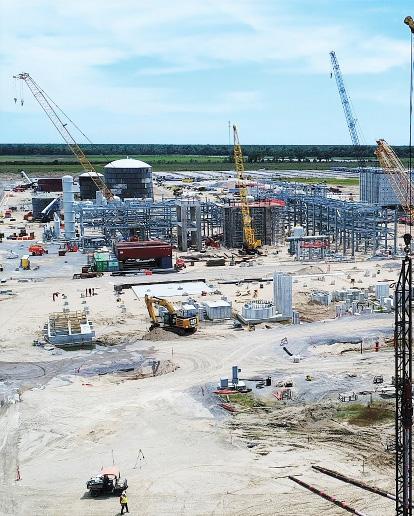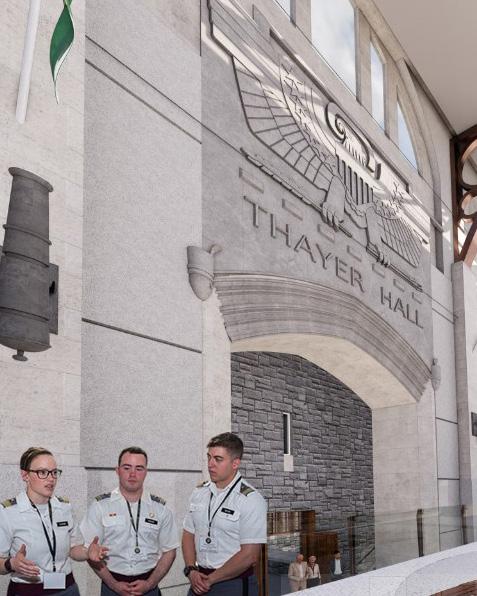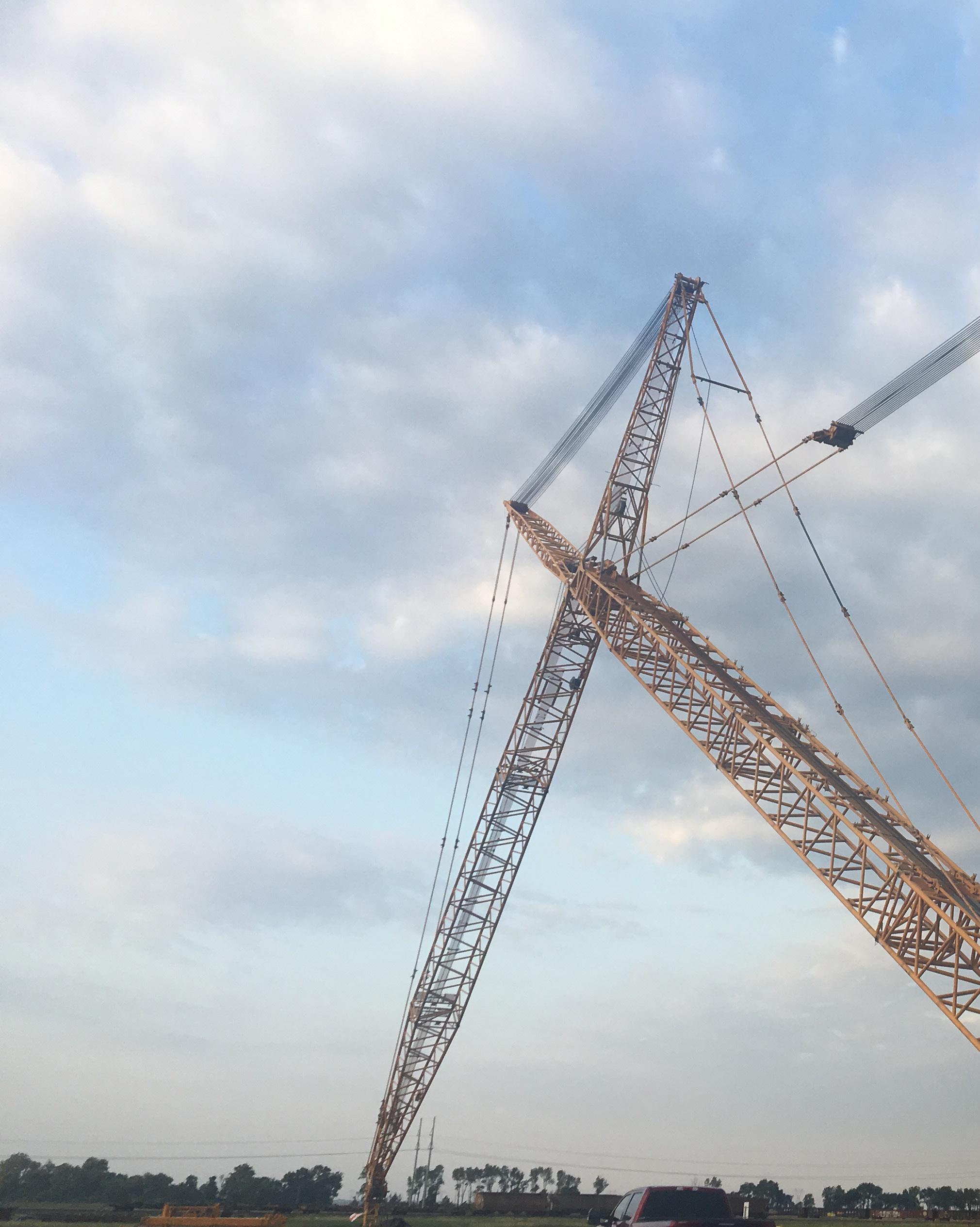
12 minute read
Associated Builders and Contractors
Giving An Industry Its Voice
Advertisement
Written by Kevin Doyle Produced by Stephen Marino

Midway through its 71st year of operation, the foundation and purpose of the Associated Builders and Contractors (ABC) has not wavered since it was founded in 1950, according to current President and CEO Michael D. Bellaman.
“We’re all about work based on merit, recognizing that each individual is unique and brings unique value, and creating those conditions so they can shine and achieve their career dreams,” explains Bellaman, an industry veteran of 23 years with extensive international experience who joined ABC in 2011. “We feel that healthy, fair and open competition grows the industry and grows career opportunities for the individuals.

“That philosophy has been extremely consistent. It’s kind of like our law of gravity – it’s always there and it guides us on all of our decisions,” he adds. “We’re making sure the industry has a great brand [while] being a leader and facilitator of helping the industry transform.” public affairs assistance as well as workforce development and health and safety training.
At a macro level, Bellaman estimates membership historically saves those companies more than $30 million annually. He points out that 99 percent of the nation’s construction firms have 100 employees or less but deliver 63 percent of annual construction spending and employ 68 percent
Based in Washington, DC, ABC highlights these high-performing organizations as a group so has approximately 21,000 member companies across the United States and provides members with political, legislative and “ companies can focus on ways to improve. It’s resource-based on actual performance and results.” - Michael Bellaman, President and CEO

of the workforce.
“The average construction company owner for these small businesses sometimes has a tool belt on. Sometimes the owner is also the director of HR and sometimes the head of safety. They wear multiple hats. They don’t have the buying power, so part of the association’s value proposition is to bring partnerships to the table and provide across a spectrum of necessities. We’re able to get best in market pricing, so a small company has the same buying power as a much larger company,” Bellaman says. “We are constantly identifying partners to work with and working out arrangements that are a win/win. The key is to make it simple.”
Interestingly, one of those small companies – Sage Policy Group, Inc. – was founded and is owned by the ABC’s Chief Economist Dr. Anirban Basu. It employs 11 individuals.
When the association articulated that value proposition in 2012 it worried how it would hold up in the face of a catastrophic event such as the COVID-19 pandemic. Turns out, it was spot on.
“It was how we delivered that significantly changed [such as] how to deliver projects safely. I’m really proud of how our membership and association worked synergistically to author, design and share safety protocols, means and methods instantly. We were updating the members daily and weekly so that everyone had information about what we were learning about this in real time,” Bellaman says.
ABC’s National Vice President for Construction Technology and
“We showcase our annual safety performance report which highlights these high-performing organizations as a group so companies can focus on ways to improve. It’s resource-based on actual performance and results.” - Michael Bellaman, President and CEO

Innovation Matt Ables shined throughout the pandemic.
“On his first day, the world shut down due to COVID. I look like a genius for having hired a Technology Innovation guy. Matt has been tremendous. The volume of technology available in our industry and the innovation that has occurred has been unbelievable,” Bellaman praises.
Programs and Initiatives
STEP (Safety Management System) – The association’s world-class safety management system is updated and improved upon annually by the top safety leaders in the country. “That framework continues to challenge, inform, educate and help our members be leaders in safety and safety performance. Members that participate are roughly twice as safe as the industry average with the top performers at 655 percent better than the industry average,” says Bellaman.
Additionally, the association’s annual Safety Performance Report, based on more than one billion work hours, is recognized by OSHA as a best practices indicator and posted to its web site.
“We showcase our annual Safety Performance Report which highlights these high-performing organizations as a group so
companies can focus on ways to improve. It’s resource-based on actual performance and results. As an example, when it comes to combatting substance abuse problems and improving onboarding, companies can lower incident rates by 60-70 percent,” Bellaman observes.
Construction Coalition for a Drug- and Alcohol-Free Workplace –ABC co-founded this organization approximately 10 years ago in response to growing access to legalized drugs and most especially opioids.
“We felt we had to do something correctively and educate members about modern programs for substance abuse and prevention. Over the course of time what we’ve learned is that in our industry – and COVID put us on the path to this – safety is about total human health, the physical and the mental, social and spiritual element. Our vision now is about healthier, happier employees having career dreams,” says Bellaman.
Construction Industry Alliance for Suicide Prevention –Understanding that aches and pains are an industry by-product and that death by suicide occurs

five times more than from a safety mishap, ABC is doing all that it can to educate members about total human health and treating the whole patient.
Construction Executive – This ABC’s magazine reaches more than 50,000 contractors and construction-related business owners and has won more than 20 editorial awards. The magazine serves as a leading source for news, market developments and business issues impacting the construction industry.
“With the technology and innovation of today, you can be in the field, or you can be in the office. Remember, a lot of our members are fewer than 10 persons, so these people are truly entrepreneurs,” Bellaman stresses.
Accredited Quality Contractor Credential – The AQC pledge is posted to the ABC website : “As an Accredited Quality Contractor, our company is committed to providing our clients with the highest quality construction services and we care deeply about our employees and the communities in which we build. We are proud to be part of the construction industry and are dedicated to the principle of free enterprise. We commit ourselves to serve our communities and to provide our employees with the skills they need to work safely and productively in order to meet the needs of our clients.”
Excellence in Construction Awards – The 31st Annual Excellence in Construction© Awards Gala was held March 10 in Grapevine, TX. Nearly 130 member companies from across the country were presented with awards for project excellence, Contractor of the Year, safety and diversity.
Addressing Issues
As the country emerges from the pandemic and returns to a state approaching some semblance of normalcy, questions have naturally arisen:
• How do you properly re-open a job site? • How do you properly sign someone into the site? • What do you do about tools? “We talked to our members in the South that deal with hurricanes because they know how to button down a site. We replicated and tweaked their protocols based on this situation and instantly had shutdown and reactivation plans for when we came out,” Bellaman says.
“We tapped into the entire membership, we were able to work with OSHA and the other government agencies and take
what we learned to governors to keep construction open. Construction is a culture of safety and this was a matter of understanding how to deliver the work safely and documented so that everybody knew what was happening,” he continues..
Working ethically and following rules that changed constantly was a daunting task.
“Information was changing and within a week would be obsolete. We were constantly on top of this, keeping our members informed so they knew what the rules were and could live by them. We had discussions with presidents and CEOs of different companies about creating space for people to work in a collaborative way to get through this,” Bellaman says.
Since most members don’t have teams of lawyers or compliance officers, ABC has worked tirelessly to help them win work, sustain their businesses, and pay their employees.
“That goes back to CEO confidence, an integral part of that confidence equation. Am I ready to buy that next piece of equipment? Do I hire that next person, or open that next office after getting

“The fact the industry is in such good shape coming out of this crisis, despite everything, is borne out by ABC’s “ Construction Backlog Indicator, which is back to where it was pre-pandemic, according to many measures. Many contractors expect rising sales and increasing profit margins, which is the most remarkable thing of all.” - Dr. Anirban Basu, Chief Economist
through COVID? We helped authoring a paycheck protection plan. The average loan size is under $100,000 but it’s a big key thing,” Bellaman asserts.
Supply chains remain disrupted, leading to volatility in commodities pricing. States that shut down completely are having trouble getting back up to speed because workers have either moved on or have left the work force altogether.
Dr. Basu explains: “The economy received a demand shock in the context of a post-pandemic world. That translates to shortages and rising prices and there’s not enough sawmill capacity to deal with that. It’s expensive and it takes time. Companies can add a shift but labor has been in short supply. This has dampened momentum in both residential and non-residential construction.”
“We have supply chain webinars and we have strategic partners who play a significant role in the supply chain so we tap into their expertise to give us a view. Lead times are getting longer because demand is higher and supply is less,” Bellaman says. “Still, over the next two years, we could need another million people based on 3.5-4 percent growth – and it could be greater than that. We’re supporting 800 educational programs across the country to make sure they have access to the talent that is available.”
Lumber prices exploded during the pandemic and, despite a recent softening, remain well above pre-pandemic levels. Dr. Basu notes that lumber prices have added an average of $24,000 to $36,000 to the cost of building a new house and is slowing new housing starts.
“We know increased lumber prices and the price of gypsum and

some other categories has hurt. Now many builders are waiting for prices to fall before they start new construction. The upward trend in permits has flattened out. However, I think you will see lumber prices continue to tumble in the weeks ahead and a re-emergence in the building permits total,” Dr. Basu observes.
“Still, we’ve heard in some instances contractors saying, “Here’s your deposit back – we cannot build a home for you at the agreed upon price.” That could trigger a breach of contract claim. Promising to do something and then not doing it is not good for a business reputation” he says.
Key Projects
According to Bellaman, the federal government has built about 1,800 projects over the last 13 years of more than $25 million and ABC members won about 60 percent of the value of those contracts.
“That just validates that our members are world class and that they are doing about $6-$8 billion in large-scale projects on an annual basis,” he says. Our members are building award-winning projects all
over the country in all the different market sectors.”
Among them are the National Museum of the American Indian, the National Museum of AfricanAmerican History and Culture, and the U.S. Air Force Memorial in Washington; a mixed-use project in Bethesda, MD and stadiums, malls, industrial and infrastructure projects. In the aftermath of 9/11, Bellaman’s previous employer pulled workers and equipment off a construction project and sent them across the street to aid The Pentagon.
Health Of The Industry
Dr. Basu notes that, in general terms, some pockets of the country are able to buck trends and thrive during a downturn.
“At the core of that is the migration pattern of people and companies. There are certain states that are appealing to both people and companies on the move,” he says. “Colorado and Texas have certainly fit that profile in recent decades. Something similar could be said for North Carolina, South Carolina, Georgia, Florida and Arizona. These states are generally the economic winners and many are in the American South.”
Construction was deemed an essential industry across much of the country at the start of the pandemic, allowing the industry to operate at some capacity and remain somewhat stable. Companies leaned on their well-stocked pipelines to keep them going.
“The fact the industry is in such good shape coming out of this crisis, despite everything, the

backlog is where it was according to many measures. Many contractors expect rising sales and increasing profit margins, which is the most remarkable thing of all because contractors have been facing so many obstacles,” Dr. Basu offers.
Looking Ahead
Even though millions of middleincome jobs go unfilled in this country every day, Dr. Basu says the near-term recovery looks promising. Trouble could arise when stimulus money evaporates.
“ABC is a force. A lot of people in society could come to believe that free market economics is not the best path for America. They see unresolved issues that come with Capitalism such as wealth inequality. The solution is to engage even more people in the free market. ABC stands for the proposition that a free market is the way to broadly shared prosperity,” says Dr. Basu.
Bellaman says the industry has embraced state-of-the-art technology – sensor technology, for example, keeps workers six feet apart on a job site– along with emerging methodologies such as pre-fab and modular building. meritocracy is that wherever your desire takes you, our industry has an opportunity for you. We put the hip waders on, go through the technology and help our members make decisions because there are just so many offerings out there,” he says.
“We have a void because we took shop, sewing, cooking and typing classes out of schools. People don’t get the opportunity to work with their hands. They don’t know what it’s like, yet there is a sense of accomplishment when you do that. Not everyone really needs to go to college to be successful, so we’re getting that story out,” he concludes.
COMPANY INFORMATION
Company Name:
Associated Builders and Contractors Country: United States Industry: Construction Est: 1950 Premier Services: Industry association representing all specialties within the U.S. construction industry.
President/CEO:
Michael D. Bellaman Website: www.abc.org







